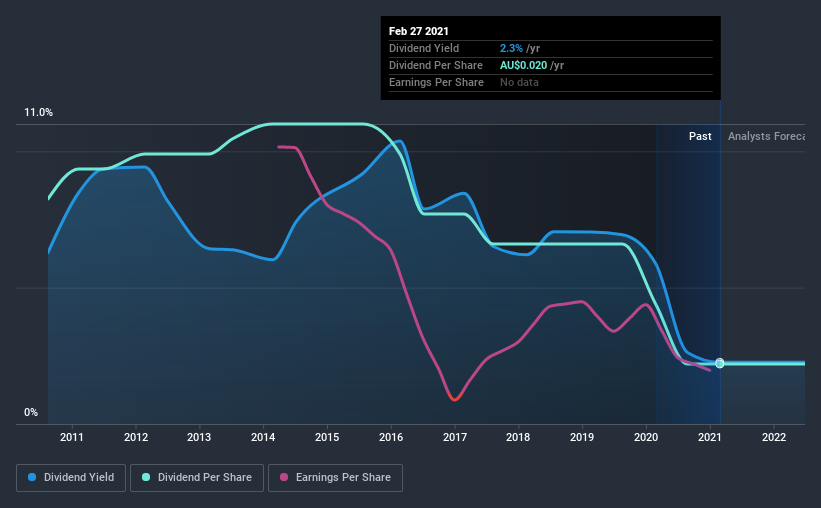Dividend Investors: Don't Be Too Quick To Buy Finbar Group Limited (ASX:FRI) For Its Upcoming Dividend
Finbar Group Limited (ASX:FRI) is about to trade ex-dividend in the next four days. This means that investors who purchase shares on or after the 4th of March will not receive the dividend, which will be paid on the 19th of March.
Finbar Group's next dividend payment will be AU$0.02 per share, on the back of last year when the company paid a total of AU$0.02 to shareholders. Last year's total dividend payments show that Finbar Group has a trailing yield of 2.3% on the current share price of A$0.885. Dividends are an important source of income to many shareholders, but the health of the business is crucial to maintaining those dividends. So we need to check whether the dividend payments are covered, and if earnings are growing.
View our latest analysis for Finbar Group
If a company pays out more in dividends than it earned, then the dividend might become unsustainable - hardly an ideal situation. Finbar Group paid out 190% of profit in the past year, which we think is typically not sustainable unless there are mitigating characteristics such as unusually strong cash flow or a large cash balance. Yet cash flows are even more important than profits for assessing a dividend, so we need to see if the company generated enough cash to pay its distribution. What's good is that dividends were well covered by free cash flow, with the company paying out 12% of its cash flow last year.
It's disappointing to see that the dividend was not covered by profits, but cash is more important from a dividend sustainability perspective, and Finbar Group fortunately did generate enough cash to fund its dividend. Still, if the company repeatedly paid a dividend greater than its profits, we'd be concerned. Extraordinarily few companies are capable of persistently paying a dividend that is greater than their profits.
Click here to see how much of its profit Finbar Group paid out over the last 12 months.
Have Earnings And Dividends Been Growing?
Companies with falling earnings are riskier for dividend shareholders. If earnings decline and the company is forced to cut its dividend, investors could watch the value of their investment go up in smoke. Finbar Group's earnings have collapsed faster than Wile E Coyote's schemes to trap the Road Runner; down a tremendous 33% a year over the past five years.
Many investors will assess a company's dividend performance by evaluating how much the dividend payments have changed over time. Finbar Group has seen its dividend decline 12% per annum on average over the past 10 years, which is not great to see. While it's not great that earnings and dividends per share have fallen in recent years, we're encouraged by the fact that management has trimmed the dividend rather than risk over-committing the company in a risky attempt to maintain yields to shareholders.
Final Takeaway
Has Finbar Group got what it takes to maintain its dividend payments? It's never great to see earnings per share declining, especially when a company is paying out 190% of its profit as dividends, which we feel is uncomfortably high. However, the cash payout ratio was much lower - good news from a dividend perspective - which makes us wonder why there is such a mis-match between income and cashflow. It's not that we think Finbar Group is a bad company, but these characteristics don't generally lead to outstanding dividend performance.
With that being said, if you're still considering Finbar Group as an investment, you'll find it beneficial to know what risks this stock is facing. We've identified 4 warning signs with Finbar Group (at least 1 which is potentially serious), and understanding them should be part of your investment process.
We wouldn't recommend just buying the first dividend stock you see, though. Here's a list of interesting dividend stocks with a greater than 2% yield and an upcoming dividend.
This article by Simply Wall St is general in nature. It does not constitute a recommendation to buy or sell any stock, and does not take account of your objectives, or your financial situation. We aim to bring you long-term focused analysis driven by fundamental data. Note that our analysis may not factor in the latest price-sensitive company announcements or qualitative material. Simply Wall St has no position in any stocks mentioned.
Have feedback on this article? Concerned about the content? Get in touch with us directly. Alternatively, email editorial-team (at) simplywallst.com.

